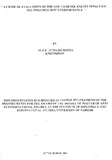| dc.description.abstract | The study investigates the extent to which the OAU Charter has influenced the
Organisation's performance and how this influence has come about.
In the methodology, it has relied almost entirely on secondary sources of information supplementedby data from primary sources. Interviews were also conducted but these were in the form of discussions with open-ended questions.
The study established that the preference of the OAU member states to pursue national interest at the expense of collective interest has been the main cause of the Organisation's inability to respond adequately to the needs of the African populations. The study has also highlighted the fact that the OAU itself has violated the provisions of its own charter from time to time, thus ignoring the very tool that is supposed to guide it in its operations. Added to these, the study has confirmed that the OAU is capable of registering success in its activities so long as the member states are willing to take a united stand on issues that call for its intervention.
The study makes the case that African leaders do not feel morally and politically bound to abide by the provisions of the Charter, hence their lack of commitment to the Organisation. As a result, they hardly ever take the Organisation seriously and only see the Summits as a time for interacting with one another but not for discussing serious issues that affect the lives of the African populations.
In the conclusion, the study states that although the OAU Charter has contributed to the Organisation's weakness from time to time, it is not the main cause of the Organisation's weakness and dismal performance. Secondly, that unless the attitude of members towards the regional organization changes, the OAU (now AU) may never improve inn its performance.
The study makes the case that the OAU should revise Article ill of its Charter to allow it to intervene in the internal affairs of its member states; this should be done with a view to protecting the African populations. It is also recommended that the OAU should form a special group of leaders on a sub-regional basis to be charged with the responsibility of analyzing issues and coming up with recommendations.
The study advocates that the OAU should be able to generate income through the provision of technical expertise to the members and other needy organisations at a fee. In the same light, the study advocates the introduction of African languages as the Organisation's languages of operation with a view to enhancing the African culture that it is supposed to protect. | en |

